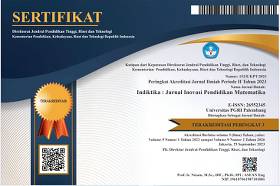PENGEMBANGAN SOAL UNTUK KEMAMPUAN PEMECAHAN MASALAH MATEMATIS SISWA KELAS XI SMA
DOI:
https://doi.org/10.31851/indiktika.v2i2.4126Abstract
ABSTRAK
Tujuan penelitian ini untuk menghasilkan beberapa soal standar yang valid dan praktis berdasarkan kemampuan pemecahan masalah matematika siswa SMA. Penelitian ini dilakukan dengan menggunakan prosedur Tessmer yang terdiri dari tahap preliminary, self-evaluation, dan prototyping. Tahap prototyping terdiri dari experts review, one-to-one, dan small group. Penelitian ini dilaksanakan pada bulan April 2018, dan siswa XI MIPA A SMAN 6 Kota Bengkulu sebagai subjek penelitian ini. Diperoleh 8 soal yang dinyatakan valid oleh ulasan 3 pakar, dan 6 dari 8 soal dinyatakan sebagai soal yang baik (terstandar) berdasarkan kategori tingkat kesukaran dan indeks daya beda.
 Kata kunci: soal esai, pemecahan masalah matematika
ABSTRACT
The purpose of this study is to produce valid and practical standard questions based on the ability to solve the mathematical problem of high school students. This research was conducted using the Tessmer procedure which consists of preliminary, self-evaluation, and prototyping stages. The prototyping stages consist of expert reviews, one-to-one, and small groups. This research was conducted in April 2018 and the subjects of this study were students of XI MIPA A SMAN 6 Bengkulu. The results of this research were obtained 8 problems that were declared valid by the reviews of 3 experts and 6 out of 8 problems were stated as good (standardized) problems based on the difficulty level category and the discriminating power index.
 Keywords : essay problems, mathematical problem solving
References
Allen and Yen. 1979. Introduction to Measurement Theory. California: Cece Munshon.
Departemen Pendidikan dan Kebudayaan. 1999. Pengelolaan Pengujian. Jakarta: Direktorat Pendidikan Menengah Umum.
Effendi, L.A. 2012. Pembelajaran Matematika dengan Metode Penemuan Terbimbing Untuk Meningkatkan Kemampuan Representasi dan Pemecahan Masalah Matematis Siswa. Jurnal Penelitian Pendidikan Vol. 12(2). [Online]. Tersedia : http://jurnal.upi.edu/file/Leo_Adhar.pdf. [13 Januari 2018].
Fadillah, S. 2009. Kemampuan Pemecahan Masalah Matematis Dalam Pembelajaran Matematika. Makalah Pada Prosiding Seminar Nasional Penelitian, Pendidikan dan Penerapan MIPA Fakultas MIPA, Universitas Negeri Yogyakarta, 16 Mei 2009. ISSN 978-979-96880-5-7. [Online]. Tersedia : https://eprints.uny.ac.id/12317/ [1 Februari 2018].
Kusaeri dan Suprananto. 2012. Pengukuran dan Penilaian Pendidikan. Yogyakarta: Graha Ilmu.
Permendikbud nomor 59 tahun 2014. [Online]. Tersedia : https://suaidinmath.wordpress.com/2014/09/10/permendikbud-tentang-kurikulum-2013-sekolah-menengah-atasmadrasah-aliyah/ [ Februari 2018].
Pijateng. 2006. Peningkatan Kemampuan Pemecahan Masalah dengan Pembelajaran Kontekstual dan Penggunaan Open-Ended Problems. Jurnal Kependidikan, Nomor 1, Tahun XXXVI : 53-68.
Suci, A.A.W dan Rosyidi, A.H. 2012. Kemampuan Pemecahan Masalah Matematika Siswa pada Pembelajaran Problem Posing Berkelompok. Jurnal MATHEdunesa, Vol. 1(2). [Online]. Tersedia : https://jurnalmahasiswa.unesa.ac.id.pdf. [1 Februari 2018].
Sumarmo, U. 2012. Pendidikan Karakter Serta Pengembangan Berfikir dan Disposisi Matematika dalam Pembelajaran Matematika. [Online]. Tersedia : https://utari-sumarmo.dosen.stkipsiliwangi.ac.id.pdf. [12 Februari 2018].
Suryadi, D. dan Herman, T. 2008. Eksplorasi Matematika Pembelajaran Pemecahan Masalah. Jakarta: Karya Duta Wahana.
Tessmer, Martin. 1993. Planning and Conducting Formative Evaluations. Philadelphia: Kogan Page.
Zulkardi. 2006. Formative Evaluation: What, Why, When, and How. [Online]. Tersedia : http://www.oocities.org/zulkardi/books.html. [Desember 2017].
Downloads
Published
Issue
Section
License
This work is licensed under a Creative Commons Attribution-ShareAlike 4.0 International License.
Authors who publish with this journal agree to the following terms:
- Authors retain copyright and grant the journal right of first publication with the work simultaneously licensed under a Creative Commons Attribution License that allows others to share the work with an acknowledgement of the work's authorship and initial publication in this journal.
- Authors are able to enter into separate, additional contractual arrangements for the non-exclusive distribution of the journal's published version of the work (e.g., post it to an institutional repository or publish it in a book), with an acknowledgement of its initial publication in this journal.
- Authors are permitted and encouraged to post their work online (e.g., in institutional repositories or on their website) prior to and during the submission process, as it can lead to productive exchanges, as well as earlier and greater citation of published work.













